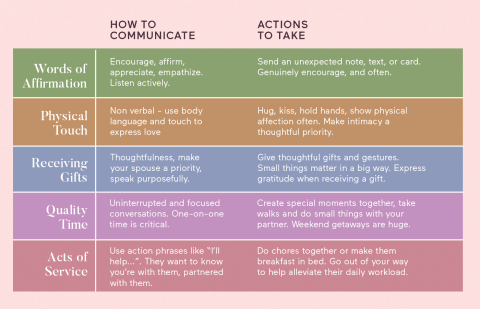“We all may relate to most of these languages, but each of us has one that speaks to us the most,” marriage and family therapist Sunny Motamedi, Psy.D., tells mbg. “Discovering you and your partner’s primary love language and speaking that language regularly may [create] a better understanding of each other’s needs and support each other’s growth.” Here’s an overview of each of the five love languages Chapman describes: “Written and spoken shows of affection matter the most to these people,” couples’ psychotherapist Fariha Mahmud-Syed, MFT, CFLE, tells mbg. “These expressions make them feel understood and appreciated.” “This love language is all about giving your undivided attention to that one special person, without the distraction of television, phone screens, or any other outside interference. They have a strong desire to actively spend time with their significant other, having meaningful conversations or sharing recreational activities,” Mahmud-Syed says. “This love language is for people who believe that actions speak louder than words. Unlike those who prefer to hear how much they’re cared for, people on this list like to be shown how they’re appreciated. Doing the smaller and bigger chores to make their lives easier or more comfortable is highly cherished by these folx,” shares Mahmud-Syed. “People whose love language is receiving gifts enjoy being gifted something that is both physical and meaningful. The key is to give meaningful things that matter to them and reflect their values, not necessarily yours,” says Mahmud-Syed. “People who communicate their appreciation through this language, when they consent to it, feel appreciated when they are hugged, kissed, or cuddled. They value the feeling of warmth and comfort that comes with physical touch,” says Mahmud-Syed. “I personally believe it also depends on gender, culture, customs, and values,” Mahmud-Syed notes. “Certain love languages which are prevalent in the West are much less common in non-Western cultures. For example, in my South Asian culture, directly praising someone is very uncomfortable and often not well received. Instead, praising that person to a third party is more highly valued when they hear about what you said about them through the grapevine. Also, public display of affection between spouses or romantic partners is also a major taboo.” For example, you might love words of affirmation, but your partner places a premium on quality time and touch. As a bid for connection, you might text him sweet nothings all day and think you’re great at expressing love; meanwhile, he might be wondering why you’re never interested in spending time cuddling on the couch together at night and may actually be feeling unloved because of that. See how it’s easy for disconnection and resentment to enter the picture? By determining our primary and secondary love language preferences, it can be easier to give each other what we innately crave. Here are some tips for dating people with each type of love language: Indeed, recent research revealed couples being aligned with each other’s love language wavelength doesn’t exactly mean it makes a successful and happy relationship. Couples who shared the same love language weren’t happier than the couples who had differing styles, suggesting mastering fluency over the love language system and adapting it based on what the partner needs at the moment is more valuable than solely relying on a dominant love language type. “It promotes codependency and prevents partners from developing autonomy and authenticity,” Motamedi adds. “A relationship is a place for transformation and growth. When we limit each other with a specific love language, we do not allow room for change.” The broad concepts, which lean on its practical simplicity, can also feel too simplistic since it’s not completely inclusive of sexuality, culture, trauma, and intergenerational differences in nuanced communities. There needs to be an understanding that human relationships are a complicated reflection of their childhood wounds and attachment style, Motamedi points out: “I believe that once the person heals the wounds of their past relationships and develops a healthy attachment style, their love language also changes.” In general, it’s important not to use love languages as a universal salve to remedy issues. It’s clear we need more skill sets than those in our tool kit to face problems that may exist below the surface of our relationship.





